US election: Has Donald Trump already blown it?
- Published
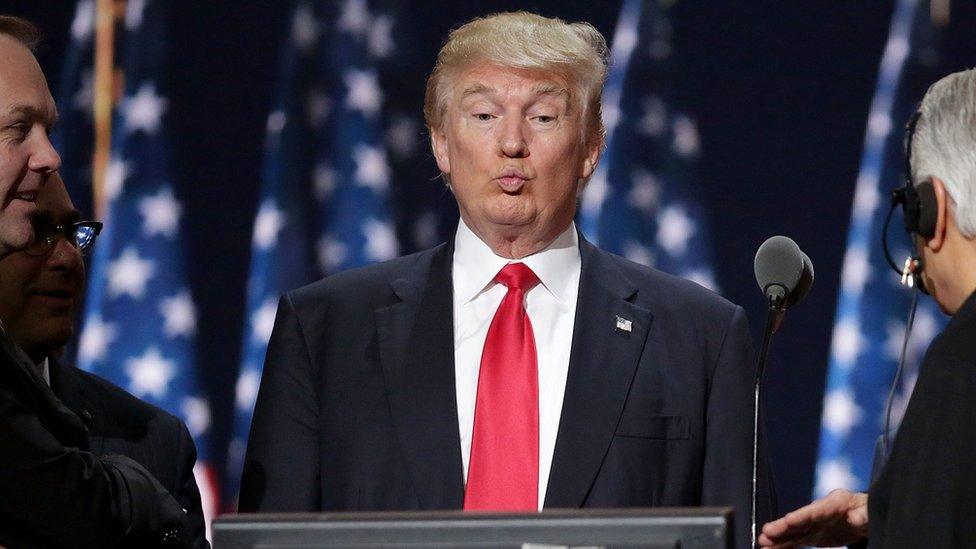
Last summer, Donald Trump could do no wrong. What a difference a year makes.
The summer of 2015 saw Trump generate so much early momentum behind his candidacy that he became almost unstoppable in his march towards the Republican presidential nomination. By Labor Day in early September, he had established a lead in the polls that rarely he relinquished.
The summer of 2016, by contrast, may well have made him unelectable as he pursues the presidency itself. By Labor Day, he could be so far behind that Hillary Clinton, hardly a popular candidate herself, would have to trip badly for him to stage a comeback.
Already, the polls point towards the first Democratic hat-trick of three consecutive victories in presidential elections since the 1940s. As Politico reported last week, external: "No candidate in Donald Trump's position at this stage of the campaign has gone on to win the popular vote in November in the modern polling era."
Decoding Trump's top five hand gestures
The personal insults, the rollicking rhetoric, the Twitter rants, the blatant falsehoods that originally powered his candidacy have more recently become acts of self-harm, whether it has been inviting "Second Amendment people" to stop Hillary Clinton or quarrelling with the Khan family. The words "Clinton landslide" have been uttered for the first time. Republicans, fearful of a Goldwater-style rout, have even explored ways of firing him as their candidate.
A key difference between last year's summer of Trumpian love and the dog days of the past few weeks is that the electorate he is seeking to woo has changed, but the billionaire continues to rely on his old seductive tricks.
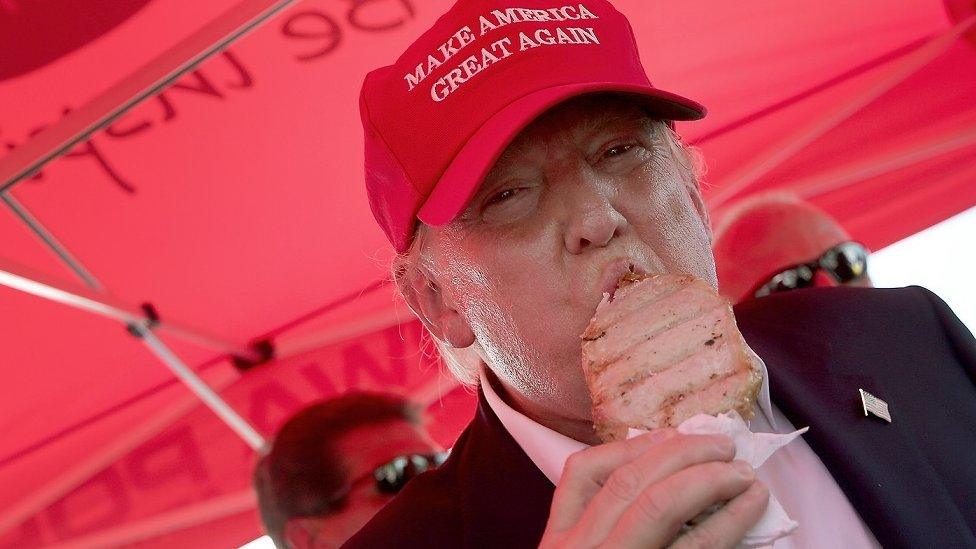
Last summer Trump enjoyed a treat at the Iowa State Fair
Campaigning for the presidency is not the same as campaigning for the presidential nomination. The demographics are vastly different - in most primary states, more than 90% of Republican voters were white. Wild statements come under greater scrutiny when voters are choosing a commander in chief as opposed to be a party nominee. Temperament looms larger. With so much more at stake, voters are more mindful that the finger punching out those ill-tempered Tweets could soon be hovering above the nuclear button.
For all that, Trump has failed to make the transition.
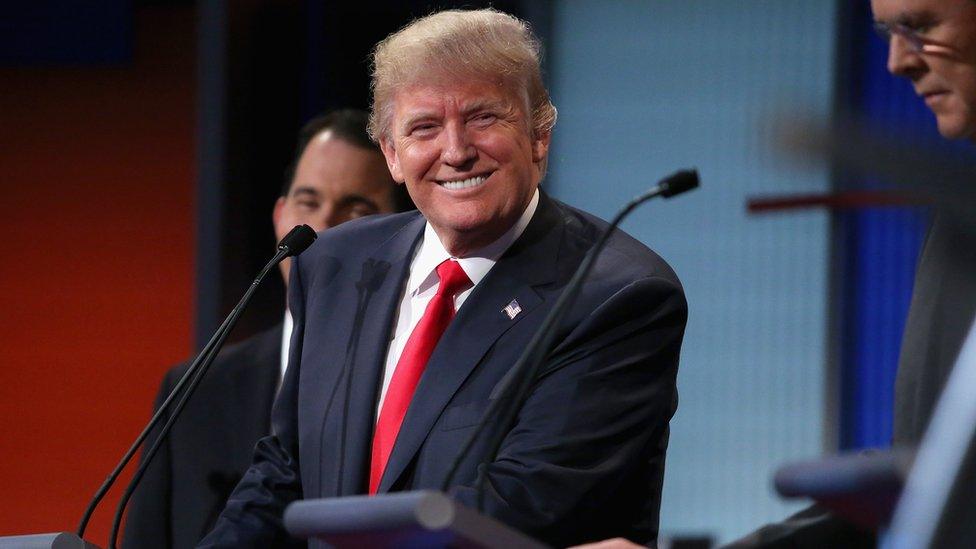
Trump was a standout at the debate in August 2015
After seeing off his Republican rivals in the primaries in the spring, Donald Trump needed to perform two pivots as the election entered its next season: first to appeal more to the broader American electorate, and second to heal the wounds from a bloody primary campaign by reaching out to the 55% of Republican voters who opted for rival candidates. Part of the explanation for his dismal polling - remember the days when Trump's stump speech was essentially a recitation of positive polls numbers? - is that he is running as if the nomination was still his goal rather than the presidency.
In this ever-more polarised electorate, the pivot towards swing voters, a staple of campaigns past, is not as important as it once was. As Bloomberg's Sahil Kapur, external noted recently, "floating voters" are thought to comprise only 5% of the electorate compared to 15% in the 1960s. Kapur also reminded us that Mitt Romney won 50% of independent voters - those who do not register as either Democrats or Republicans - compared to Obama's 45%, but still lost the election.

Trump found time for a trip to his Scottish golf course in July of 2015
Trump's larger problem, at a time when elections are increasingly decided by which party can maximise its turnout, has been his failure to unify the Republican base. All but one of the five living Republican presidential candidates - Bob Dole - boycotted the Republican convention in Cleveland.
So, too, did the host governor, Trump's former rival John Kasich, which is doubly problematic since no Republican has ever won the presidency without winning Ohio. Six Republican Senators have refused to back him, along with eight House lawmakers and two Republican governors. Then there are the 50 Republican national security experts who have openly voiced opposition, including the former NSA director Michael Hayden and former UN ambassador John Negroponte.
Of the two party conventions, the Democratic gathering in Philadelphia may have looked and sounded the more raucous because divisions between Bernie Sanders and Hillary Clinton supporters were on nightly display. But it was the absentees in Cleveland, and those who have come out against Trump since, who were more electorally significant. For all the fractiousness of Philadelphia, polls repeatedly show that Democrats are more loyal to Hillary Clinton than Republicans are to Donald Trump.
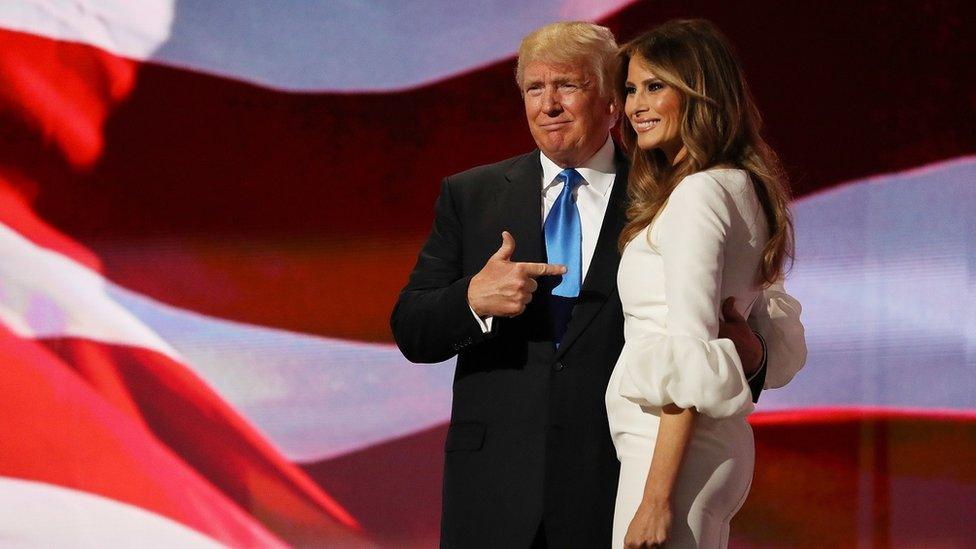
The 2016 Republican convention lacked high-profile speakers; Mr Trump's wife Melania's speech lifted phrases from Michelle Obama's 2012 address
The property tycoon continues to poll strongly with non-college educated whites, but a big education gap is opening up. As Ron Brownstein recently reported, external, Trump could become the first Republican in 60 years not to win a majority of college-educated whites.
Trump also has a gender problem. Whereas Mitt Romney won more than 90% of Republican women in 2012, polls have suggested that only around 70% of Republican women are prepared to vote for Trump.
All this helps explain why some of the Republican states do not now look such a lustrous shade of red as they did on Memorial Day, the unofficial start of summertime. Georgia, which hasn't voted for a Democrat since Bill Clinton carried the state in 1992, is now thought to be competitive. Utah has become an improbable target state for Hillary Clinton because of the antipathy towards Trump from Mormons. Lyndon Johnson was the last Democrat to take it in 1964, in that landslide win over Barry Goldwater.
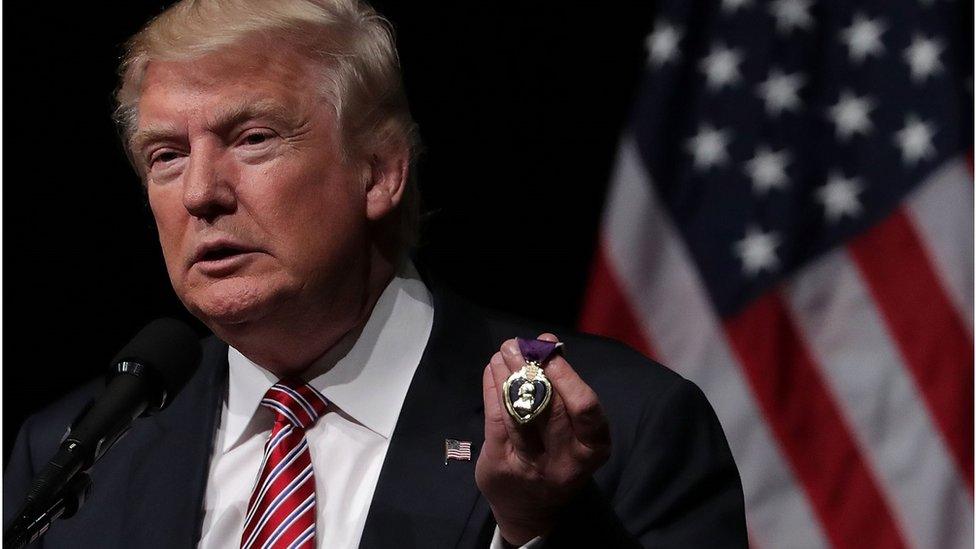
This summer Trump has been dogged by gaffes, like saying he "always wanted" to receive a Purple Heart, given to wounded service members.
Even at a basic organisational level, Trump is failing, hence the description of him as a candidate without a campaign. For all his much-vaunted business smarts, he made a slow start in raising much-needed funds and has not constructed the sort of national organisation ordinarily required to win a presidential election. As late as June, for instance, Trump has no state director in the must-win state of Ohio.
Evidently, he continues to believe that he can triumph in this election with his smart phone, the free airtime he gets from television interviews, his personal magnetism, and a small team, centred largely on family members, operating out of Trump Tower. His shake-up this week has sidelined advisers, like Paul Manafort, who were trying to normalise his candidacy and to bring more message discipline to his freewheeling campaign. Again, it underscores how Trump has flunked the transition from being the figurehead of his highly personalised insurgent campaign to his new role as the standard-bearer of the Republican Party.
This summer has also produced the kind of pivotal moment that can decide elections. In 1960, it was Nixon sweating profusely during his first televised debate with Kennedy. In 1988, it was Michael Dukakis in a tank. In 2012, it was the release of the film showing Mitt Romney talking about the "47%." In 2016, it appears to have been the moment on the final night of the Democratic convention, when Khizr Khan stood with his wife, Ghazala, waving a pocket-sized copy of the US Constitution accusingly at Donald Trump, and declaring: "You have sacrificed nothing and no one."
Mr Khan waved his copy of the US Constitution
Up until then, many of Donald Trump's nativist attacks on Mexicans and Muslims have, to many voters I suspect, seemed rather abstract. The Khans gave them a face, a backstory and a human dimension: two Gold Star parents and their son, Captain Humayan Khan, a decorated war hero who loved to read books about Thomas Jefferson.
Travelling through the American south last week, I repeatedly came across Republican-leaning voters who thought that this time, finally, Trump had gone too far - that he had crossed a behavioural threshold, that his candidacy had become too crazed. For all that, the most common refrain I heard was that voters are deeply unhappy with the choice before them, which is why this race is not yet over. Dismay at Donald Trump has not grown into fervour for Hillary Clinton, and never will.
That Khan moment highlighted another difference between this summer and last. Back then, controversy generated attention and attention generated support.
For Donald Trump, that calculus that worked for him in the Republican primaries no longer seems to work.